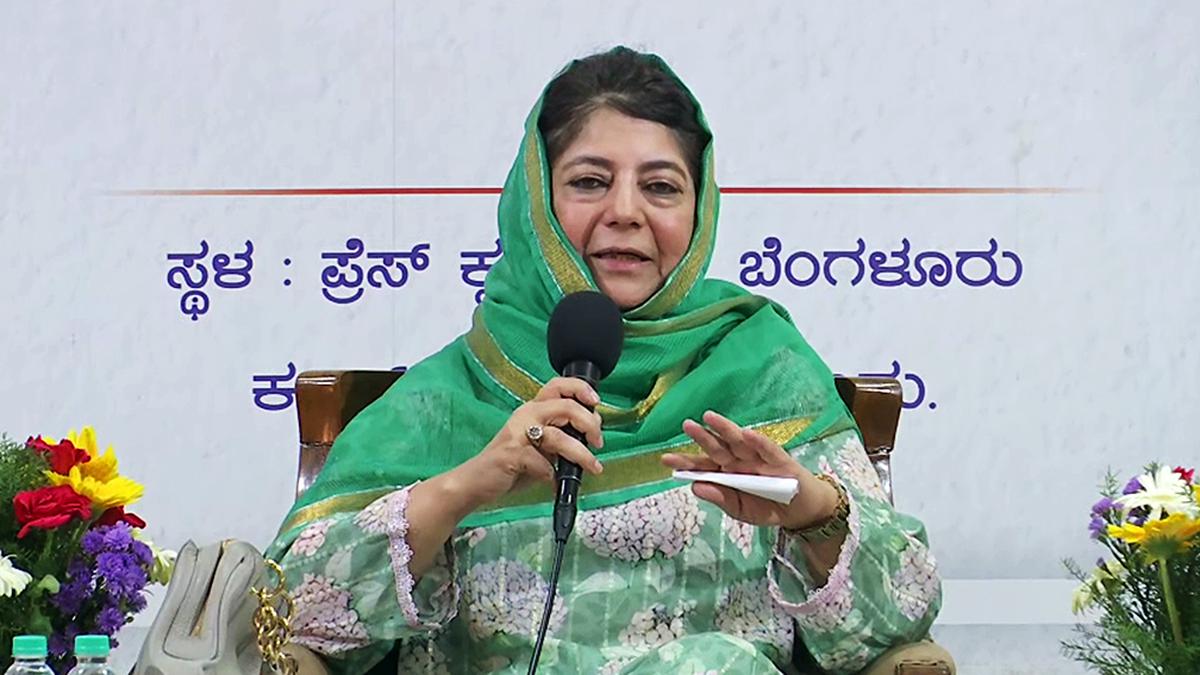
Preserve burial site of Kashmir’s last Muslim king as ‘relic of history’: Mehbooba Mufti to Bihar CM
The Hindu
Ahead of the anti-BJP Opposition parties meet in Patna on June 23, People’s Democratic Party (PDP) leader Mehbooba Mufti visited the burial ground of Kashmir’s last Muslim king Yusuf Shah Chak in Bihar’s Nalanda district to pay obeisance. She also appealed to Bihar Chief Minister Nitish Kumar to take steps to “preserve the relic of history” which is in “absolute disrepair and ruins”.
Ahead of the anti-BJP Opposition parties meet in Patna on June 23, People’s Democratic Party (PDP) leader Mehbooba Mufti visited the burial ground of Kashmir’s last Muslim king Yusuf Shah Chak in Bihar’s Nalanda district to pay obeisance. She also appealed to Bihar Chief Minister Nitish Kumar to take steps to “preserve the relic of history” which is in “absolute disrepair and ruins”.
The PDP leader reached the Kashmir Chak of Biswak village on June 22, along with top district officials. She paid obeisance by reciting Quranic verses at the burial ground, and did chaadar poshi (sheet offering) at the cemeteries of King Yusuf Shah Chak and his family members. After her visit, Ms. Mufti tweeted, “Paid obeisance at Yusuf Shah Chak’s grave in Bihar. As the last Muslim ruler of Kashmir, his resting place symbolises the ties between Kashmir & Bihar. Unfortunately the site is in absolute disrepair and ruins”. Nalanda is also the Bihar’s CM’s home district.
Yusuf Shah Chak ruled Kashmir from 1579 AD and 1589 AD and was one of the last Muslim rulers of independent Kashmir. He had succeeded his father Ali Shah to become king, but was exiled thousands of miles away in Bihar’s Nalanda district, when Mughal emperor Akbar annexed Kashmir in 1586 AD. The ex-monarch was given land in the Islampur block of Nalanda distinct and was also permitted to maintain a cavalry of 500 soldiers. The place where he settled was known as Kashmir Chak. Though he died in Odisha in 1592 AD, his body was brought back to Islampur and buried there in the village of Biswak.
Spread over 8 bigha (nearly 5 acres) of land in one corner of Biswak, the cemetery contains the grave of the Kashmiri king, along with his wife Habba Khatoon and other family members, according to the plaque etched on the faded pink boundary wall erected in 2016 by the then-motawallia (custodian), the late Abdul Rashid. His grandson Yasir Rashid is the current motawallia of the burial ground, which is in shambles and has become a safe haven for land-grabbers. There are 10 large and small cemeteries within the boundary wall.
In 1977, then-J&K Chief Minister Sheikh Abdullah — along with writer and historian M.Y. Taing and other family members — had also visited the place to pay homage to the man popularly known as the ‘last King of Kashmir’, promising to develop and preserve the site. Following his visit, the main road from where the single lane road takes a right turn towards Biswak village was named after him.
“In 2015, even the J&K government was said to be contemplating to reclaim the mortal remains of Yusuf Shah Chak, but nothing happened and land-grabbers continued having their field day at the burial ground,” rued Mr. Rashid. “I’ve written over 200 letters to Bihar, Central and J&K governments for the development of the place as it holds significance not only for tourists but also for academics and historians,” he told The Hindu over phone. “The cemetery of the King of Kashmir is struggling today to protect its identity from land grabbers and encroachers of the village,” he added.
Only a few Muslim families have remained in Biswak village today, with others have migrated to other places. The village of over a thousand households now comprises mostly Kurmi, Yadav and Other Backward and Extremely Backward Caste communities.











